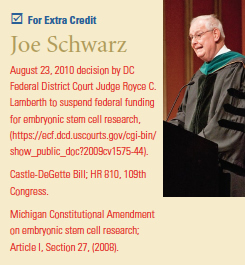In March 2009, just seven weeks after taking the oath of office, President Obama signed an executive order ending an eight-year ban on federal funding for virtually all human embryonic stem cell research. "Medical miracles do not happen simply by accident," said Obama in his press announcement. "They result from painstaking and costly research—from years of lonely trial and error, much of which never bears fruit—and from a government willing to support that work."
 |
|
Joe Schwarz |
Dr. John J.H. (Joe) Schwarz, a practicing otolaryngologist and one of the few medical doctors to serve in the Michigan Senate and the U.S. House of Representatives, openly praised Obama's decision. Then this August, when a DC Federal District Court Judge ruled against Obama's order, Schwarz predicted, "the inevitable (and correct) appeals precipitated by this ruling are going to be an ongoing public policy issue." While an appeals court has temporarily suspended the ban on federal funding for embryonic stem cell research, Schwarz and others are concerned about the impact of uncertain funding on ongoing U.S.-based research.
Schwarz (R-MI) represented Michigan's 7th Congressional District in the House from 2005-2007, and was there when H.R. 810, the Stem Cell Research Enhancement Act sponsored by Diana DeGette (D-CO) and Mike Castle (R-DE), passed with clear bipartisan support. But when President Bush vetoed the bill, he and other supporters couldn't produce the two-thirds super-majority needed to override the decision. It wasn't until Obama's executive order that researchers could apply for National Science Foundation support for projects using discarded embryos to look for cures for a wide variety of diseases—from spinal cord injuries to neurodegenerative disease, sickle cell anemia, and much more.
In the state of Michigan, restrictions on this research are equally stringent, says Schwarz, a lecturer at the Ford School. In a Constitutional Amendment approved by the Michigan electorate in 2008, human embryonic stem cell research became legal (it was once a felony offense), provided scientists adhere to rigorous and appropriate regulations by the Secretary of Health and Human Services and the National Institutes of Health. Schwarz, a leading Republican supporter of this research—one who is often contacted by the press to weigh in on the topic—has been involved at the state level as well. Several bills have been introduced in the Legislature which would mandate onerous and unnecessary reporting requirements on embryonic stem cell researchers, says Schwarz.
This past year, Schwarz was routinely contacted by the media to discuss another pressing health policy issue—health care reform. While in Congress, Schwarz served on the Armed Services, Science, and Agriculture Committees, each of which had oversight of some piece of federal health policy. His former colleagues on those committees—from both political parties—sought his advice both during the development of various elements of the health care reform legislation, and during the subsequent debate.
Below is a formatted version of this article from State & Hill, the magazine of the Ford School. View the entire Fall 2010 State & Hill here.